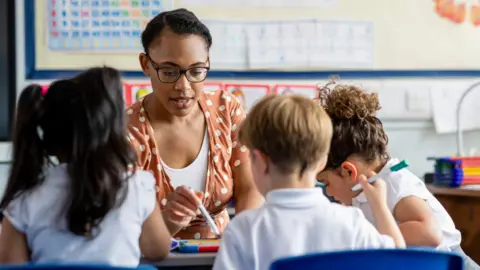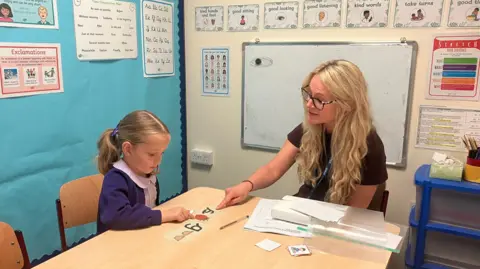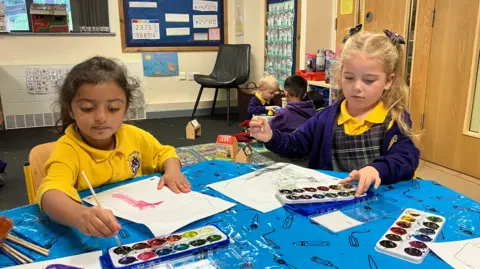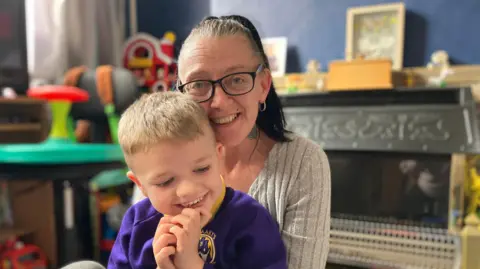More school-starters missing key skills, teachers say
5 hours agoKate McGoughEducation reporter, BBC News

 Getty Images
Getty ImagesSchools are “picking up the pieces” as more children start reception without key skills such as speaking in full sentences or using the toilet independently, teaching unions have told the BBC.
A third of teachers have at least five children in their school’s reception class who need help with going to the toilet, a survey of more than 1,000 primary school teachers in England suggests.
Nine in 10 who responded to the Teacher Tapp survey had seen a decrease in speech and language abilities among new starters over the past two years.
The government previously announced a target for 75% of children to be at a good level of development on leaving reception by 2028.
At St Mary’s Church of England Primary School in Stoke, speech and language therapist Liz Parkes is helping reception pupil Gracie sound out words that rhyme.
Liz comes to the school once a week to do one-to-one interventions like this, and to offer training and support to teachers on how to spot issues.
Around a quarter of pupils at St Mary’s need some extra support with speech and language when they join reception, but with Liz’s help that number is down to just a handful of pupils by Year 2.
Liz says social isolation is partly the reason for the decrease in communication skills.
“Children are increasingly spending a lot of time looking at a screen and not necessarily engaged in more meaningful interactions or developing the kind of listening skills you need when you hit nursery and reception.
“We’re seeing children in reception who haven’t experienced having conversations on a regular basis or aren’t having a range of experiences where they’re exposed to language.”

 BBC/Kate McGough
BBC/Kate McGoughTeacher Tapp, a survey tool, asked primary school teachers in England about school readiness a week into term. In results seen exclusively by BBC News, they found:
- 85% of 1,132 respondents said they had at least one reception pupil who needed help going to the toilet
- 33% have at least five children needing help, while 8% had at least 10
- 92% reported a decrease in speech and language abilities among reception starters over the past two years.
A Department for Education spokesperson said that the government was working to ensure that a record share of children are “school-ready” at the age of five, “turning the tide on inherited challenges of lack of access to high-quality early education, and helping teachers focus on teaching so every child in the class can achieve and thrive”.
The spokesperson added that the government had already increased access to early years care for hundreds of thousands of families and was investing £1.5bn to “rebuild early years services”.

 BBC/Kate McGough
BBC/Kate McGoughCatherine Miah, deputy head at St Mary’s Church of England Primary School in Stoke, encouraged schools to budget for a speech and language therapist, who could have an “incredible” impact on children.
“We’ve had to make sacrifices elsewhere, but if children aren’t ready to learn you could sit them in front of the best phonics lessons in the world, they’re not going to take it onboard if they’ve not got those learning behaviours.”
The school says a third of its pupils need help with toilet training when they join nursery, but the school works with parents to ensure they are toilet-trained by the time they reach reception.
“We’re a team. It’s not a case of saying to parents ‘This is your job. Why haven’t you done it?’ We need to work together.”
How to help with the transition from home to school
The government has set a target that 75% of children leaving reception at five years old will have a “good level of development” by 2028. Last year 68% of children were at that level, so an extra 45,000 children a year are needed to reach that goal.
To achieve a “good” level of development, a child is assessed by teachers at the end of their reception year on tasks including dressing, going to the toilet, and paying attention in class.
Pepe Di’Iasio, of the Association of School and College Leaders, said reception teachers were “brilliant” at supporting young children but local services have been badly eroded over the past decade.
“It has left schools picking up the pieces,” he said. “Many children are starting school already several months behind their peers.”
Parenting charity Kindred Squared found that teachers are spending 2.5 hours a day helping children who haven’t hit developmental milestones instead of teaching.
They have written a set of guidelines for parents to check whether their child has the skills they need to begin school.
The Department for Education was approached for comment.

 BBC/Kate McGough
BBC/Kate McGoughDiane’s son has just started Year 1 at St Mary’s in Stoke this year. She says without the school’s support he would have been much further behind in his development.
“Within two weeks he was out of nappies,” said Diane. “They would help him on the toilet here and I’d do it at home, we’d work together.”
Teachers say her boy is thriving, but Diane says the school has been instrumental in supporting his special educational needs and improving his speech and language.
“He does a lot for himself, whereas before he was always dependent on me. School have helped me to help him become more independent and more confident,” she said.
Additional reporting by Emily Doughty